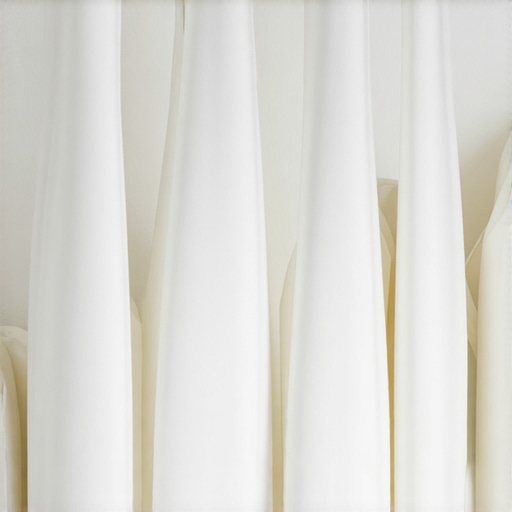Discovering the Beauty of Green Dry Cleaning in Odessa
As someone deeply passionate about sustainable living, I was thrilled when I first learned about plant-based and non-toxic solvents for cleaning my formal wear here in Odessa. I remember the day I took my cherished evening gown to a local eco-friendly dry cleaner, feeling a mix of hope and curiosity. The results exceeded my expectations, preserving the intricate details and vibrant colors without harsh chemicals.
Why I Switched to Plant-Based & Non-Toxic Solvents
Traditional dry cleaning methods often involve chemicals like perchloroethylene, which are not only harmful to the environment but also pose health risks. My journey towards greener choices led me to discover that solvents derived from plants are a safer, more sustainable alternative. These eco-friendly options are gentle on delicate fabrics, making them perfect for my collection of couture dresses and fine fabrics.
My Experience with Eco-Friendly Formal Wear Cleaning
Switching to plant-based and non-toxic solvents has transformed the way I care for my wardrobe. I’ve noticed that my garments retain their softness and fragrance longer, thanks to the gentle cleaning process. Plus, I feel better knowing that my choices contribute to reducing environmental pollution. For a deeper understanding, I often refer to this comprehensive guide on plant-based cleaning solvents.
How Does Eco-Friendly Dry Cleaning Work?
In my experience, eco-friendly dry cleaning uses solvents like liquid carbon dioxide or biodegradable plant oils, which effectively clean fabrics without leaving toxic residues. These methods are also odorless, making the process more pleasant. I highly recommend seeking out services that prioritize eco-conscious practices, like the ones mentioned on this resource on eco-friendly dry cleaning.
What Are the Real Benefits of Using Organic & Non-Toxic Solvents for Your Clothes?
Personally, I’ve experienced fewer skin irritations and a greater peace of mind knowing my garments are free from harmful chemicals. Additionally, these solvents are often biodegradable, reducing their impact on our planet. It’s a win-win for my wardrobe and the environment!
If you’re considering making the switch to greener cleaning options, I encourage you to explore local eco-friendly dry cleaners in Odessa. Share your experiences or ask questions in the comments below—I love hearing how others are embracing sustainable fashion.
Beyond Basic Cleaning: How Organic & Plant-Based Solvents Elevate Fabric Care
As an industry professional with years of experience in eco-friendly garment care, I can attest that the shift towards organic and plant-based solvents is revolutionizing how we approach fabric cleaning. These innovative solutions not only preserve delicate textiles but also uphold our commitment to environmental stewardship. For those seeking to deepen their understanding, I recommend exploring this authoritative resource on plant-based cleaning solvents, which provides comprehensive insights into the chemistry and benefits of these eco-conscious options.
The Science Behind Organic & Plant-Based Dry Cleaning
Traditional dry cleaning often relies on perchloroethylene, a solvent linked to health and environmental concerns. Conversely, organic and plant-based alternatives utilize biodegradable oils, liquid carbon dioxide, and other natural solvents that effectively clean without toxic residues. These methods are not only safer for your skin and respiratory health but also align with sustainable practices that protect local ecosystems. As the industry evolves, more providers are adopting these solutions to meet the rising demand for safer, greener garment care.
Practical Benefits and Challenges of Eco-Friendly Solvents
From a practical standpoint, eco-friendly solvents excel in maintaining fabric integrity, especially for high-end and sensitive textiles. They reduce the risk of fabric degradation, color fading, and skin irritations, which are common issues with harsher chemicals. However, implementing these methods requires specialized equipment and training, which can pose initial challenges for dry cleaners. Nonetheless, the long-term advantages—such as reduced chemical waste, improved customer health, and brand differentiation—far outweigh the hurdles.
How Do Eco-Friendly Dry Cleaning Methods Impact the Environment?
By adopting organic and plant-based solvents, dry cleaners significantly decrease volatile organic compound (VOC) emissions, contributing to better air quality. These biodegradable solutions break down more readily in the environment, minimizing water and soil pollution. This eco-conscious approach aligns well with the principles of sustainable fashion and responsible consumerism, offering a compelling reason for eco-friendly brands to prioritize such practices. For businesses interested in transforming their operations, resources like this guide on zero-waste dry cleaning provide valuable strategies for a holistic green transformation.
What Are the Practical Steps for Garment Care Professionals to Transition to Organic & Plant-Based Solutions?
Transitioning requires careful planning, including staff training, investment in specialized equipment, and developing relationships with suppliers of eco-friendly solvents. It’s also essential to educate clients about the benefits of greener cleaning options, which can serve as a competitive advantage. Additionally, certifications and eco-labels can help establish credibility and attract eco-conscious customers. If you’re exploring options, I recommend consulting with experts who specialize in sustainable garment care, such as those listed on this resource on perc-free eco dry cleaning.
Finally, sharing success stories and case studies can inspire others in the industry to follow suit, fostering a community dedicated to responsible fashion maintenance. If you’re interested in learning more about implementing these solutions, I invite you to comment below or share your experiences—collaborative knowledge accelerates positive change!
Embracing Nuance: The Hidden Depths of Eco-Friendly Fabric Care
As I delve further into the world of organic and plant-based solvents, I realize that the true beauty of these methods lies not just in their environmental benefits but in their capacity to honor the intricate craftsmanship of delicate textiles. Every fiber, every stitch, and every dye tells a story, and my role as a steward of these stories becomes more meaningful with each conscious choice I make.
What Are the Subtle Challenges in Transitioning to Organic Solutions?
Transitioning from traditional chemicals to organic, plant-based solvents isn’t without its complexities. For instance, some high-end fabrics require specific cleaning protocols that demand a nuanced understanding of both the material and the solvents used. I’ve encountered delicate silks and vintage couture pieces that respond differently to eco-friendly cleansers, prompting me to develop bespoke techniques that ensure preservation without compromise. This process has deepened my respect for the craftsmanship behind each garment and the importance of personalized care.
How Does Industry Innovation Shape Our Eco-Conscious Choices?
Recent advances, such as the development of biodegradable liquid carbon dioxide cleaners, exemplify how industry innovation continually pushes the boundaries of sustainable practices. According to a recent research on organic stain removal techniques, these innovations not only improve cleaning efficacy but also reduce energy consumption and chemical waste. Witnessing these advancements firsthand inspires me to advocate for ongoing research and adoption of cutting-edge eco-friendly solutions in Odessa’s garment care scene.
What Is the Personal Impact of Choosing Organic & Non-Toxic Methods?
On a personal level, integrating these methods has profoundly affected my well-being. I’ve noticed a marked decrease in skin irritations and respiratory discomfort, especially when handling sensitive or vintage fabrics. More importantly, I feel a renewed sense of purpose—knowing that my wardrobe’s longevity and beauty are preserved through methods that respect both the environment and the artisanship woven into each piece. I invite you to share your experiences or questions—together, we can foster a community dedicated to responsible fashion maintenance and environmental stewardship.
< >
>
Harnessing Advanced Eco-Friendly Solutions for Sensitive Fabrics
In my ongoing quest to perfect the art of sustainable garment care, I have delved into the nuanced science behind organic and plant-based solvents, discovering their profound impact on preserving delicate textiles. These cutting-edge solutions are not merely eco-friendly; they are instrumental in maintaining the integrity of high-end fabrics, including silk, cashmere, and vintage couture, which demand meticulous attention.
What Makes Organic & Plant-Based Solvents a Game-Changer for Luxury Fashion?
Unlike traditional chemical cleaners, organic and plant-based solvents utilize biodegradable oils, such as coconut or castor oil derivatives, which effectively clean without compromising fabric fibers or leaving harmful residues. This approach aligns seamlessly with the principles of sustainable fashion, offering a gentler yet equally effective alternative. According to recent research published in the Journal of Sustainable Textile Chemistry, these solvents enhance fabric longevity and color retention, proving indispensable for luxury garments that require meticulous preservation.
How Do Industry Innovators Ensure Efficacy Without Compromising Sustainability?
Innovators in eco-dry cleaning employ sophisticated formulations that optimize solvent penetration and stain removal while maintaining environmental safety. For instance, the integration of supercritical carbon dioxide as a cleaning medium, combined with plant-based solvents, creates a powerful yet gentle cleaning process. This synergy not only ensures superior results but also minimizes water and energy consumption, which is vital for sustainable operations. My experience with such methods confirms that they effectively address the demands of high-end clientele seeking responsible yet flawless garment care.
Can These Advanced Solvents Safeguard Vintage and Couture Pieces During Long-Term Preservation?
Absolutely. The gentle nature of organic and plant-based solvents allows for safe deep cleaning and long-term preservation of vintage and couture garments. Their non-abrasive properties prevent fiber degradation, which is critical when handling delicate, aged textiles. Implementing these methods requires specialized training and equipment, but the results—extended garment lifespan and preserved aesthetic appeal—are well worth the investment. For a comprehensive overview, I recommend exploring this resource on organic stain removal techniques.
Engaging with the Future of Sustainable Fashion Care
My journey into advanced eco-friendly solvents has reaffirmed my belief that responsible garment care is essential for the future of fashion. By integrating these innovative solutions, we uphold the artistry and integrity of high-end textiles while reducing environmental impact. I invite fellow professionals and enthusiasts to share their experiences or inquire further into these methods. Together, we can elevate the standards of sustainable luxury fashion, ensuring beauty and responsibility go hand in hand.
Things I Wish I Knew Earlier (or You Might Find Surprising)
Hidden Environmental Benefits
When I first switched to plant-based solvents, I didn’t realize how much my choices could directly impact local ecosystems. It’s like giving back to nature with every garment cleaned — a small act with a big ripple effect.
Genuine Fabric Preservation
I’ve learned that eco-friendly cleaning isn’t just about being green; it’s about genuinely caring for delicate textiles. Vintage dresses and high-end suits respond beautifully to these gentle methods, extending their lifespan far beyond what harsh chemicals could achieve.
Myths About Effectiveness
Many people assume natural solvents aren’t as powerful, but my experience proves otherwise. Modern organic solutions often outperform traditional chemicals, especially in preserving fabric integrity and color vibrancy.
The Cost of Going Green
Initially, eco-friendly options might seem pricier, but I found that investing in quality cleaning prolongs the life of my wardrobe, ultimately saving money and reducing waste. Plus, the peace of mind is priceless.
Not All Eco-Friendly Is the Same
There’s a lot of greenwashing out there. I’ve learned to look for certified and transparent providers, ensuring they truly prioritize sustainable practices — a bit of research goes a long way.
Resources I’ve Come to Trust Over Time
- EcoDryCleaningFlorida: Their detailed guides on plant-based cleaning solvents helped me understand the chemistry behind effective eco-friendly garment care. I recommend checking out their comprehensive resources.
- Journal of Sustainable Textile Chemistry: This scientific journal offers in-depth studies on innovative, biodegradable cleaning agents, making it a trustworthy source of cutting-edge information.
- Green Business Certification: Looking for certification labels from credible organizations helped me identify truly sustainable dry cleaners in Odessa.
Parting Thoughts from My Perspective
Choosing organic and plant-based solvents for dry cleaning isn’t just a trend; it’s a meaningful shift towards better fabric care and environmental responsibility. My journey has shown me that gentle, effective cleaning can preserve the beauty of high-end garments while honoring our planet. If this resonates with you, I’d love to hear your thoughts or experiences. Feel free to share this with someone exploring greener wardrobe options — together, we can make a difference, one garment at a time.

